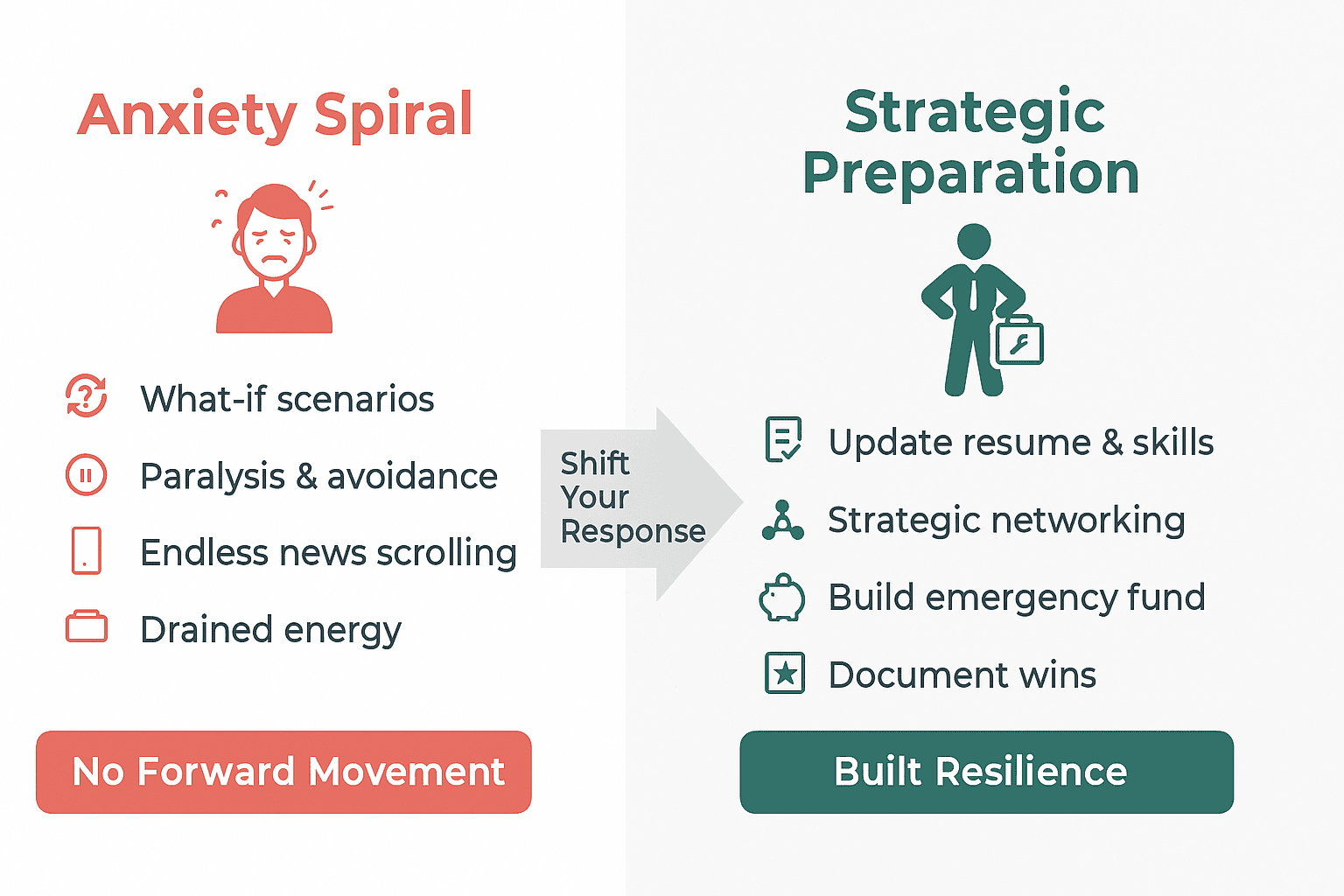Layoff Rumors Flying? How to Tell if Your Worry is Productive or Paralyzing
You get a Slack message: “Mandatory All Hands.” Your stomach plummets. Budget cuts are mentioned in a meeting. Your manager seems stressed. Instantly, your brain floods with job insecurity anxiety: “Am I next? Will I lose my job?”
This fear is exhausting and common, especially with recent tech layoffs and economic uncertainty.
But here is a critical distinction: Is your worry helping you to take productive action, or is it paralyzing you with anxiety?
In my long corporate career and my coaching practice, I have seen hundreds go through this stomach-churning fear. The problem is – if you let your emotions have the upper hand, you lose the opportunity to prepare. This only adds to your stress, taking away your ability to be proactive.
The first step in the process to tackle this is to understand the difference between thoughts and reality, so you can control your thoughts and prepare.
Anxiety vs. Preparation: Know the Difference
Your brain’s threat detector (the amygdala) can’t easily distinguish between a vague future possibility (layoffs might happen) and an immediate danger.
It often defaults to panic mode, shutting down rational thought.
This leads to:
Anxiety (Destructive):
- Creating “what if” scenarios, catastrophizing
- obsessively checking the news or LinkedIn
- feeling frozen
- avoiding looking at finances
- updating your resume
Energy is drained with no forward movement.
On the contrary, if one wanted to think and act rationally, they would take the opportunity to engage in Preparation, which will lead to:
Preparation (Productive):
- Acknowledging the possibility of disruption
- creating contingency plans
- updating your resume and skills
- networking strategically
- building an emergency fund.
Energy is used to build resilience and options.
Hope you will agree with me – One feels like drowning; the other feels like having a Life Jacket.

Why Does Job Insecurity Anxiety Feel So Real?
- It feels real because your brain thinks it’s helping you survive.
- By running worst-case scenarios, it believes it’s preparing you.
However, what I have found is that without immediate and concrete action, this just becomes a cycle of worry that can harm your mental health and potentially even your current job performance.
Common thought patterns fueling destructive job insecurity anxiety include:
- Fortune Telling: “I’m definitely getting laid off.”
- Catastrophizing: “Losing this job means my career is over.”
- Mind Reading: “My boss is being quiet because I’m on the list.”
Transforming Fear into Actionable Strategy
The goal is not to eliminate concern about job security entirely – that is not realistic. The goal is to channel that energy into practical preparation.
You can do it by taking two key steps:
- Challenging the Anxious Thoughts: Using structured techniques to do a reality check of catastrophic predictions and reduce its emotional intensity .
- Building Genuine Career Resilience: Taking consistent, small actions to document your value, develop in-demand skills, and maintain your professional network.
When you know you’re actively preparing and have gathered evidence of your marketability, your Job Insecurity Anxiety dramatically decreases, even if the uncertainty itself remains.
Hope this was useful and will help you to channelize your mind in the proper direction required for keeping your morale high.
In case you want to learn practical techniques on how to do it, my eBook “The Burnout Fix” provides specific tools for both:
- The Career Anxiety Thought Record to challenge worry spirals
- The Decatastrophizing Process to face worst-case scenarios rationally
- Practical systems for Accomplishment Documentation, Skill Development, and Strategic Networking.
Ready To Shift From Job Insecurity Anxiety to Confident Preparation?
Grab your copy of The Burnout Fix ebook for the complete system to manage career anxiety, build resilience, handle burnout, set boundaries, and more.
Why Trust My Advice?
With 35 years as a senior HR executive at global organizations and a behavioral coach, I’ve directed talent strategies for thousands of employees across technology, finance, CPG, and Manufacturing sectors. I’ve participated in layoff planning sessions, observed how decisions are made, and guided hundreds of professionals to not just survive but thrive in challenging markets. My strategies aren’t theoretical—they’re battle-tested, creative, based on behavioral science, and designed to provide you with a competitive edge. Whether securing an ideal position or avoiding a layoff, I offer coaching based on insights and real-world experience not available elsewhere.
Please feel free to reach out if you need specific and personalized coaching related to your situation.
For other insightful articles, please read my blog.
